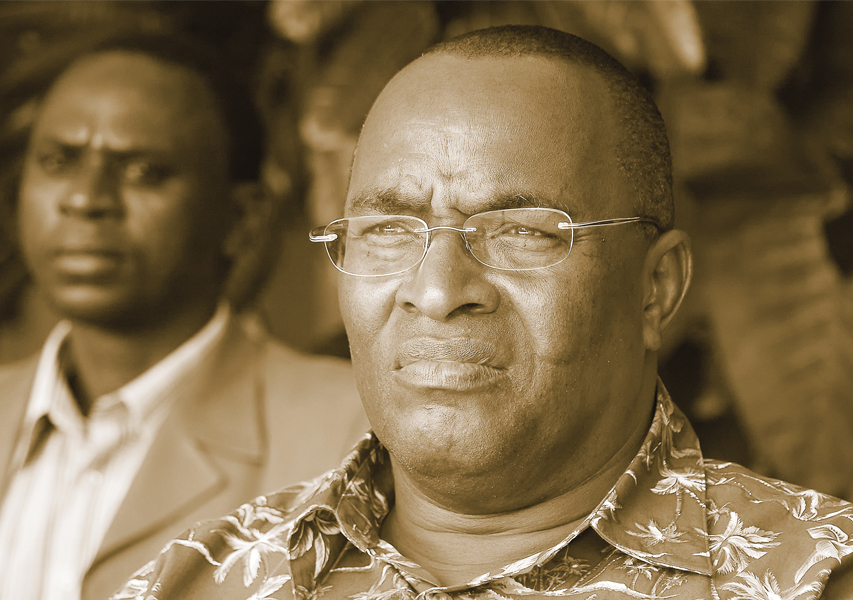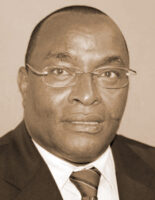
Gideon Musyoka Ndambuki was one of the technocrats in President Daniel arap Moi’s Cabinet who climbed his way up the ranks of the ruling party, KANU, to become its National Organising Secretary. For some reason, Ndambuki served in four government ministries in the five years of Moi’s final term between 1998 and 2002.
During Moi’s frequent Cabinet reshuffles, Ndambuki was moved from the Office of the President to the ministries of Lands and Settlements, Higher Education, Science and Technology, and Economic Planning and National Development.
For 16 uninterrupted years – from 1997 to 2013 – he was the Member of Parliament for Kaiti Constituency in what was Makueni District (now Makueni County). In 1998 he was elected on a KANU ticket and re-elected to the seat in the historic 2002 multiparty elections. He was also the Makueni District Chairman.
Ndambuki was born around 1947 – he is not sure of the exact date – in Nzuuni Village, Kaiti Constituency. He attended the local Mukuyuni Primary and later Ukia Primary schools between 1958 and 1965 for his basic education. Being of a strong and stout build, he excelled in sporting activities during his primary school days, especially field events such as shot put, discus, javelin and the hammer. He became so good at shot put that when he later went to Kangundo High School in 1966, he represented the school at district and national levels for the four years he was there.
From 1976 to 1978, Ndambuki trained in banking under the auspices of the Bank of America and subsequently received a scholarship to Emporia State University in the United States of America for a degree course in business management. He qualified with an MBA four years later.
Back home, his entry point in employment was in the banking sector. In 1981, he joined Commercial Bank of Africa as an Accounts Manager and in 1986 moved to Trade Bank as Manager, rising to the position of Managing Director until its collapse in 1993. Trade Bank was a politically connected institution that was frequently under scrutiny by the media and Parliament for allegedly providing unsecured loans, especially to politicians and businessmen considered close to Moi’s government.
As boss of the bank, which was fronted by Asian tycoons, Ndambuki found himself immersed in the politics of the day until the bank eventually collapsed. When he later joined Lima Finance, an institution said to be associated with Moi, Ndambuki effectively became one of the President’s business and financial handlers. It was during this period that Moi apparently saw Ndambuki’s political potential and encouraged him to enter the fray.
Ndambuki contested and won the Kaiti parliamentary seat on a KANU ticket in 1998 and quickly consolidated his support, forging political links with the area’s political heavyweights including the Ukambani region’s party supremo, Mulu Mutisya, who was Moi’s point man in the area.
Perhaps as a reward for having handled his business and financial dealings when he worked at Trade Bank and Lima Finance, Moi appointed Ndambuki Minister in the Office of the President in charge of Development, Disasters and the Drought Management Programme, Directorate of Personnel Management and Defence. In Ndambuki, the President knew he had a trusted pair of hands. Curiously, however, he worked there for just about a year.
“The country was hit by severe drought that year,” Ndambuki recalled. “I went all over the country distributing food to drought victims as well as the victims of the El Niño floods that followed. I was also involved in (spearheading and coordinating) the search and rescue operations following the 1998 terrorist bomb attack at the American Embassy.”
In the same year, he was moved to oversee the Defence docket, which was run from the Office of the President rather than being an independent ministry. This was during the no-nonsense Chief of General Staff Daudi Tonje’s tenure . His Permanent Secretary was Sally Kosgei, who would later rise to head the entire civil service as well as become Secretary to the Cabinet.
Ndambuki would not divulge any highlights of his time in Defence “… in the interests of national security”. It is, however, significant that this was the period when through General Tonje, the military introduced measures to professionalise the force, resulting in promotions based on academic performance, lowering the retirement age for the military top brass and allowing servicewomen to get married.
Ndambuki was moved to the Ministry of Lands and Settlement where, he said, he embarked on the computerisation of the ministry’s records and enhanced revenue collection.
In 2001, he was transferred to the newly-created Ministry of Higher Education, Science & Technology as its first minister. The ministry, he said, developed polytechnics and vocational training centres across the country.
His record of moving from one ministry to another and serving in four of them within the span of five years became something of a joke in Ukambani, especially among his rival politicians.
They would often joke behind his back that he was always found unsuitable for whichever ministry he was appointed to. Regarding his frequent transfers, Ndambuki could only comment that the appointment of Cabinet ministers was the prerogative of the President.
What he did not say, however, was that Moi’s final term witnessed tectonic political shifts as the President’s loyalists, several of whom were in the Cabinet, started warming up to the Opposition with the emergence of other political parties. Those perceived to show pro-Opposition tendencies were quickly jettisoned, resulting in frequent Cabinet reshuffles.
Of all the different postings, Ndambuki most enjoyed his tenure in the Ministry of Economic Planning and National Development, which he took over from the late Prof George Saitoti in the heady election year of 2002. He prides himself for negotiating funding for Kenyan farmers as well as export trade deals.
“As Minister in charge of the African, Caribbean and Pacific (ACP) Countries’ Agreement, I travelled to many countries,” said Ndambuki. “I negotiated the Starbucks coffee funding through the European Union (EU) to the Co-operative Bank of Kenya to cushion Kenyan coffee growers. I also successfully negotiated the export of Mumias sugar to the EU under the ACP Pact as well as the export of Kenyan fish to Europe and Israel.”
It was during his stint as Minister for Economic Planning that the off-and-on national census exercise was finally completed. The last census had been held in 1990 and was next due in 2000. But after Parliament voted to allocate rural development funds to districts, including a Constituency Development Fund (CDF) according to population, among other factors, the census issue became a political hot potato. Politicians became suspicious of the intention behind the population count whenever it was announced, leading to its postponement.
But Saitoti had managed to overcome the political shenanigans associated with the census and by the time he vacated the office and Ndambuki took over the reins, it was all systems go.
Satitoti resigned to join the Opposition after Moi named Uhuru Kenyatta as his preferred successor through KANU. Saitoti and other Opposition leaders, among them Raila Odinga, Kalonzo Musyoka, Charity Ngilu, Martha Karua and Kijana Wamalwa, all presidential hopefuls, formed the National Rainbow Coalition (NARC) led by Democratic Party (DP) leader Mwai Kibaki. The coalition went on to resoundingly defeat Kenyatta, who had been nicknamed ‘Moi Project’, and dramatically end KANU’s 40-year reign.
Ndambuki successfully negotiated the export of Mumias sugar to the EU under the ACP Pact as well as the export of Kenyan fish to Europe and Israel
“When we lost the election, Uhuru became KANU Chairman, William Ruto Secretary General (replacing Raila Odinga) and I was elected Organising Secretary (replacing Kalonzo Musyoka),” Ndambuki recalled in an interview. “I won the Kaiti seat again, becoming the only MP elected on a KANU ticket in the entire Eastern Province!”
After the polls that ushered Kibaki into State House, with Kenyatta as Leader of Official Opposition in the House, Ndambuki was appointed Shadow Minister for Water and Irrigation where he dissected budgetary allocations to the ministry and challenged the government’s policies and actions on the ministry at every turn.
In 2007, he was re-elected as the Kaiti MP on an Orange Democratic Movement-Kenya (ODM-K) ticket, having defected from KANU. He was appointed Assistant Minister for Agriculture under Cabinet Minister William Ruto in the Grand Coalition government that had Kibaki as President, Odinga as Prime Minister and Musyoka as Vice President.
Ndambuki is credited with the distribution of subsidised fertiliser to farmers across the country as well as certified maize seeds in a deliberate effort to increase production to boost strategic reserves of the crop.
In the 2013 General Election, Ndambuki decided to contest the Makueni County Senate seat on a Wiper Democratic Movement ticket under the Coalition for Reforms and Democracy (CORD). He was however wiped out by the party’s Secretary General, Mutula Kilonzo, at the nomination stage, after which he retired from active politics.
Ndambuki returned to public service in 2017, when he was appointed by President Uhuru Kenyatta to the plum position of Chairman of the National Social Security Fund (NSSF), a position he holds to date.
He attributes his long service as MP for Kaiti to his performance in the constituency, which included campaigning for the construction of the Katumani-Wote road which kicked off in 2002 at a cost of KES 2 billion during Moi’s tenure. Also during Ndambuki’s tenure as Kaiti MP, power lines were installed from the Mombasa-Nairobi road to Wote, the district headquarters, in addition to the construction of up to 17 health facilities, 30 dams and several administration centres for chiefs and district officers.
“The Red Cross donated through me 100 tonnes of certified maize seed, which I distributed to farmers in Kaiti,” he recalled. “I was the first Kamba MP to start a bursary fund, which I set up after I invited President Moi who raised KES 9 million for the initiative. I was able to achieve a lot thanks to the President, who had lunch in my house four times during his visits to Makueni.”
Reflecting on his tenure as a minister, Ndambuki said Moi had a hands-on policy and was intent on knowing everything that happened in each ministry.
“If we had more freedom to run our ministries, things would have moved faster. Also, initially we were not allocated clear jobs. We were expected to go to the airport to receive State visitors and so on. Remember that many Cabinet ministers were of retirement age but a few of us were young and energetic and needed work to do, not sit idle. So a few of us approached the President about this situation and we were allocated work. Eventually, we became part of the policymaking process.”
Ndambuki is married to Dr Philomena Ndambuki, a lecturer at Kenyatta University, and they have five children, three sons and two daughters. Ndambuki now wants to settle down to a quiet life running his businesses and perhaps writing his memoirs after 35 years of government service.
